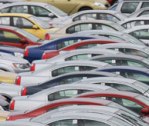The legality of the vehicle emissions testing regime has been thrown into doubt after the courts ruled the European Commission had no power to weaken emissions limits for on-the-road tests.
The new Worldwide harmonised Light vehicle Testing Procedure (WLTP) is supported by a second procedure that measures NOx and particulate emissions, called the Real Driving Emissions (RDE) test.
RDE is a 90-minute on-road test, with apparatus attached to the car measuring exhaust gases. However, the European Commission had introduced a rule allowing vehicles to emit more than double the emission limit for NOx the so-called “conformity factorâ€.
If NOx emission levels exceed 2.1 times those achieved in the WLTP (for example 168mg/km instead of 80mg/km – the current Euro 6 diesel limit), it counts as a fail and the vehicle must be retested before approval.
The conformity factor tightens to 1.8x by 2019 and 1.5x in 2020 (120mg/km instead of 80mg/km) for new cars (and all cars in 2021). It will be reduced to 1x as soon as possible, but by 2023 at the latest.
Three cities – Brussels, Madrid and Paris – challenged the provision amending the emission limits within the RDE test and the European Court of Justice (ECJ) ruled in their favour yesterday (Thursday, December 13).
The Court found that the European Commission had no power to weaken the emission limits. The Commission will now need to amend the RDE regulation to ensure that vehicles comply with the stricter nitrogen dioxide emissions limit of less than 80mg/km during real driving and, therefore, during RDE tests.
Reacting to the decision, Client Earth lawyer Ugo Taddei said: “This is great news not only for the people of Brussels, Madrid and Paris, but for all Europeans, as this ruling will help to clean up the air all across the EU.
“It is also a landmark ruling for access to justice across the EU as it means cities have the right to bring EU institutions to court when they breach environmental law.â€
He continued: “The new RDE was meant to address the Dieselgate scandal, yet by weakening the emission limits through the conformity factors, the European Commission shamefully chose to protect the interest of car manufacturers rather than the health of European citizens.
“Despite an early warning from Client Earth that the new regulation was illegal, the European Commission allowed the industrial lobbies to dictate the rules that regulate some of their most polluting products.â€
The European Commission will have 12 months to amend the relevant legislation from when the period to bring an appeal expires, or, if an appeal is brought, from the date on which it is dismissed.
Taddei said: “We hope the Commission will comply with the ruling and immediately amend the regulation. An appeal would send an extremely negative message and delay urgent action to protect the health of all Europeans.â€
The European Commission told Fleet News takes that it will analyse the judgement in detail to see how it intends to proceed.
Mike Hawes, chief executive at trade body the Society of Motor Manufacturers and Traders (SMMT), said it was also reviewing the judgement and awaited the Commission’s response.
However, Hawes added: “It’s important to note that a conformity factor was introduced to account for the uncertainties associated with a new, innovative, test procedure to improve real-world emissions as quickly as possible. By 2021 it will disappear altogether, with only the annually-reviewed allowance for measurement inaccuracy remaining.
“The average driver will experience far lower emissions because in real life the most extreme conditions included in the on-road test – such as speeds of up to 100mph – should not occur on any UK journeys.â€
It is unclear what the ECJ’s decision will mean for other cities around Europe. However, Areeba Hamid, clean air campaigner for Greenpeace UK, is in no doubt. “The new generation of ‘clean’ Euro six diesel engines can now be banned from Paris, Brussels and Madrid,†she said. “There is no reason why London, and cities across Britain, should not follow suit.”








